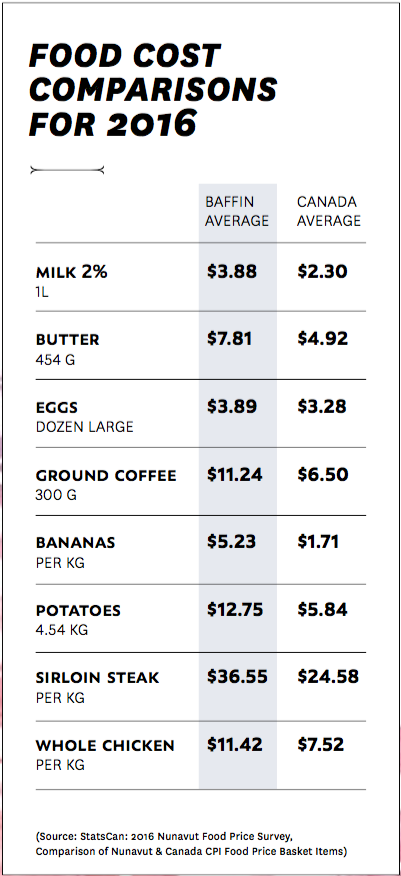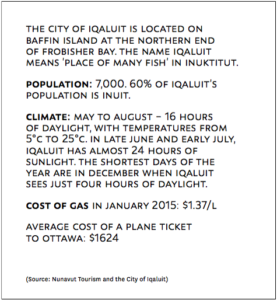Nunastar’s Northern Experience
Tunngasugitsi IQALUNGNUT Angajuqqaaqarvik Nunavummi (Welcome to Iqaluit, Capital of Nunavut)

The logistics of shipping, receiving and storing goods is an ongoing challenge in remote operations, especially with things like fresh produce. Having a backup plan is essential; the culinary team at Frobisher Inn is always prepared to substitute ingredients, or switch out recipes depending on the availability of food products.
“Having a team of chefs that thrive on understanding our business cycles means that we can more often than not forecast most issues and have a contingency plan at hand,” says Bandeira, adding that this helps to grow accountability and ownership among the staff in his kitchen. Through working closely with suppliers and partners, Bandeira has learned that an operation can “identify potentially troublesome periods of the year, where weather plays an immense part in the way [they] order and receive goods.” Understanding the ebb and flow of the buying cycle can help a business save money while offering customers the foods they want.
Beyond food sourcing issues, remote locations pose a challenge for staffing and human resource issues. By embedding themselves into the culture of Iqaluit and being a positive force for integration in the community, Frobisher Inn has over- come potential staffing issues.
By emphasizing a collaborative work culture “that fosters skill development and creates personal ownership and pride,” employees at the hotel feel as though they are in a home away from home, says Bandeira. “One of our breakfast servers had been working for quite some time without a break, covering staff holidays during the summer. After breakfast service was done our F and B manager pleads with him to take a day off and rest. The server looks at him, nods in agreement and decides that a day o would be most welcome. Later that same day, soon after our dinner pre-shift at 5:30, our restaurant is over-run by a number of guests. Not even the most experienced floor manager would have been prepared for such service.
No sooner had our F and B manager made his peace with the imminent service disaster, our breakfast server walks through the door putting on his apron, scouting the room, apologizing for his tardiness! I am very proud to be a part of this establishment, while most businesses are trying the find loyal staff, ours come through the door 24 hours before their shift apologizing for being late.”
 Creating a space for employees and the community to be proud of can reap great rewards—and help with community buy- in when doing business in remote areas. As a final note, Bandeira gives this word of advice to restaurateurs who are looking to capitalize on the bene ts of a remote or unique location: “study, know and listen to your client base and adapt to their ever-changing needs.”When it comes to running a food- service operation of any size, location is critical to its survival. From shipping and sourcing products to technology and staffing, operating in rural or remote communities comes with a different set of challenges than those we find in urban areas of Canada.
Creating a space for employees and the community to be proud of can reap great rewards—and help with community buy- in when doing business in remote areas. As a final note, Bandeira gives this word of advice to restaurateurs who are looking to capitalize on the bene ts of a remote or unique location: “study, know and listen to your client base and adapt to their ever-changing needs.”When it comes to running a food- service operation of any size, location is critical to its survival. From shipping and sourcing products to technology and staffing, operating in rural or remote communities comes with a different set of challenges than those we find in urban areas of Canada.RESTAURANTS CANADA MEMBER, NUNASTAR, ON ITS PRESENCE IN NUNAVUT
 Frobisher Inn in Iqaluit is recognized as the city’s largest premium, full-service hotel: boasting the award-winning Frob Kitchen & Eatery and a gourmet co ee bar, the Caribrew Cafe, along with many other amenities. In addition to providing competitive packages for employ- ees—full-time staff are offered employee housing, a benefit plan and staff meals— Frobisher Inn is an integral part of life in Iqaluit, and is regarded as a space “for the gathering and dining needs for the community at large.”
Frobisher Inn in Iqaluit is recognized as the city’s largest premium, full-service hotel: boasting the award-winning Frob Kitchen & Eatery and a gourmet co ee bar, the Caribrew Cafe, along with many other amenities. In addition to providing competitive packages for employ- ees—full-time staff are offered employee housing, a benefit plan and staff meals— Frobisher Inn is an integral part of life in Iqaluit, and is regarded as a space “for the gathering and dining needs for the community at large.”
How does a business thrive—despite unique and extreme challenges such as high food costs, high transportation costs, and affordability? General Manager Christiano Bandeira has worked in food and beverage for 20 years; he joined Nunastar earlier this year because of what he refers to as the commitment to excellence, the determination to succeed and an interest in team development. “Building a successful foodservice business is a matter of balance,” says Bandeira. While the location is a key factor, it is not the only consideration, nor is it a distinctly Canadian issue. “My personal belief is that the proposal has to fit with the location, demographics, value proposition and market environment. Balance, as in most things, is necessary in order to achieve success,” he says.









